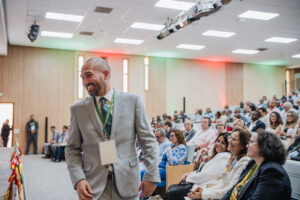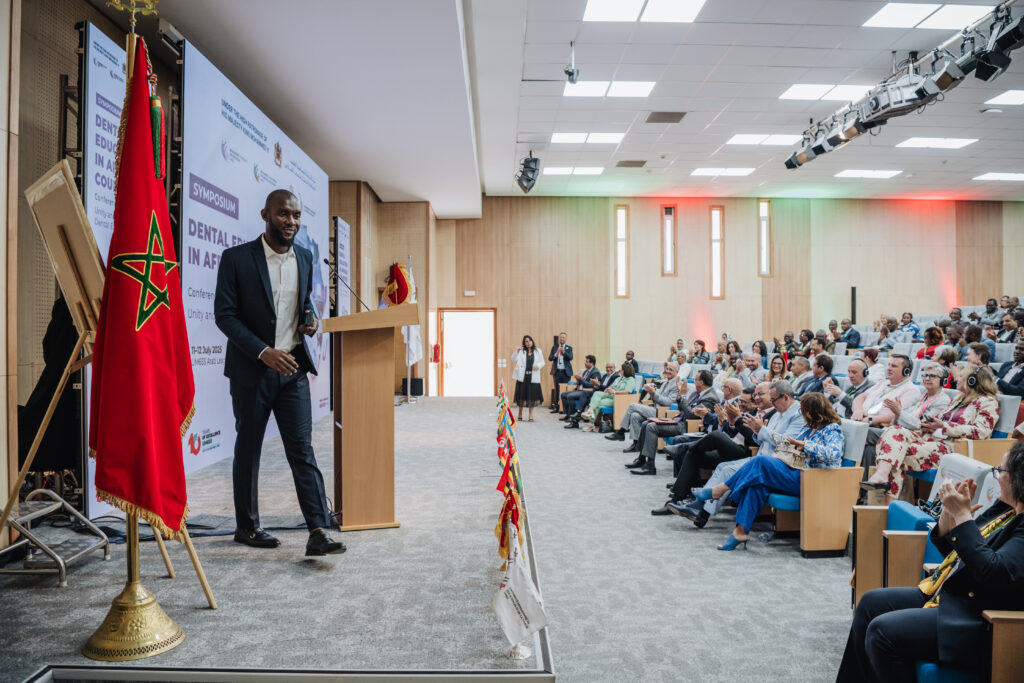A landmark moment in dental education takes place in Morocco as African leaders unite to shape the future of dental healthcare across the continent
What began as a dream two years ago has now become a reality in Casablanca, Morocco. On July 11 and 12, 2025, representatives from 24 nations across the continent gathered at Université Mohammed VI des Sciences de la Santé (UM6SS) for the inaugural African Dental Education Symposium, which culminated in the creation of the groundbreaking African Education Dental Association (AEDA).
The need for an association of this kind is pressing, as African nations face a critical shortage of dental professionals. According to the World Health Organization, there are just 0.44 dentists per 10,000 people (https://apo-opa.co/46H8Yv2) in Africa, compared to around 7 per 10,000 (https://apo-opa.co/4f0Tgx6) in many high-income countries. Only 84 dental schools operate (https://apo-opa.co/46H8Yv2) across 26 African nations. This contributes to the fact that, as of 2021, around 42% of Africa’s population have untreated oral diseases.

The symposium, initiated by Professor Ihsane Benyayha, Dean of the UM6SS Dental School, and supported by international surgical charity Mercy Ships, brought together deans and directors from dental schools across Africa. This gathering, and its successful signing of a new association, marks a new chapter in intentional collaboration and innovation in dental education.
“I think that we, as African leaders, African professors, African dentists, we can do a lot for our countries. We should help each other. I see that we have an American Dental Education Association, and a European one… Why not an African Education Dental Association?” said Professor Benyayha.
“We’re at a time where it should no longer be acceptable for any country to have one dentist per 1 million people. Now is the time to solve this issue and overcome it. All the stakeholders and leaders we need are in this room. We need to ask ourselves; how can we take the next step?” said Dr. David Ugai, Mercy Ships Country Director for Guinea.
The African Dental Education Symposium centered around a clear purpose: to catalyze African nations collaborating in new and dynamic ways to train dental professionals, develop sustainable education programs, and strengthen access to dental health throughout the continent.
” Cooperation between African countries will allow the various dental schools in Africa to speak with one voice “
Key to fulfilling this mission is the launch of the African Education Dental Association, modeled after similar associations in the United States and Europe. The association will provide African dental educators with a unified voice, a space for sharing best practices, and a clear structure for long-term collaboration.
“This is the realization of a great dream… This symposium is a necessity because everyone was in their own countries, working in isolation. But thanks to the symposium, we will be able to join forces, combine efforts, and try to share our points of view. Cooperation between African countries will allow the various dental schools in Africa to speak with one voice,” said Professor Mohamed Siddick Fadiga, Head of the Department of the Université Gamal Abdel Nasser de Conakry Dental School in Guinea.
The symposium also featured international leaders, including the FDI World Dental Federation, the American Dental Education Association, and Association for Dental Education in Europe, offering their support as African deans and program directors take the lead in transforming dental education for the next generation.
As of 2025, Mercy Ships has partnered with UM6SS to support the training of more than 20 dental professionals from Guinea, Benin, and Madagascar in advanced specialization programs. After graduating, these students will return home equipped to teach, mentor, and expand access to dental care in their own communities.
“This symposium is the first to my knowledge. It’s the first time I’ve seen so many schools come together in one country to discuss the problems of dental education in Africa. So, it’s quite clear that this symposium is part of the history of dental education in Africa, and I hope it’s just the first of more,” said Professor El Hadj Babacar Mbodj, Dean of UCAD Dental School in Senegal.
Mercy Ships’ partnerships extend far beyond Morocco. Across Africa, long-term collaboration with universities and ministries of health is helping expand infrastructure, enhance clinical training, and equip faculty to strengthen dental healthcare capacity. These efforts currently span the continent, including:
- In Guinea, Mercy Ships’ ongoing partnership with Université Gamal Abdel Nasser de Conakry (UGANC) has revitalized the nation’s dental education opportunities and renovations have more than doubled the school’s training capacity.
- In Senegal, an upcoming expansion to the dental school at Universite Cheikh Anta Diop in Dakar will increase clinical training chairs from 30 to over 70.
- In Togo, Mercy Ships is helping to build the first simulation and clinical training space at the University of Lomé, which first opened a dental program in 2019.
- In Benin, Mercy Ships is training future educators to reopen the nation’s only dental school, which closed in 2018 due to a lack of specialty professors and infrastructure.
- In Burkina Faso, a brand-new partnership will support training faculty development at the country’s growing dental school.
- In Madagascar, Mercy Ships is sponsoring dentists for specialization to become specialists and future national university professors.
- In Sierra Leone, Guinea-Bissau, and Liberia, Mercy Ships is sponsoring a student exchange program through Université Gamal Abdel Nasser de Conakry that will increase access to dental education and expand the dentist workforce in their respective countries.
“In the school’s years of existence, we have never thought about the next generation of teachers. But thanks to this partnership with Mercy Ships, we have hope for the survival of the school with the continuity of these young graduates who will return with their diplomas to our country. So, this partnership, for us, is very precious,” shared Professor Jeannot Randrianarivony, Dean of the University of Mahajanga Dental School in Madagascar.
The African Dental Education Symposium reflects the heart of Mercy Ships’ mission: to bring hope and healing through surgical care and education, training, and advocacy. Events like the symposium offer a glimpse into a sustainable future where nations are equipped, educators are empowered, and communities have access to the care they need.







OTHER ARTICLES
Editorial — Prevent, inform, and act for women’s health in Africa
Kenya : Government Prioritises Maternal Health and Strengthens Support for Community Health Promoters
Strengthening pandemic prevention, preparedness, and response capacities in Senegal using the “One Health” approach